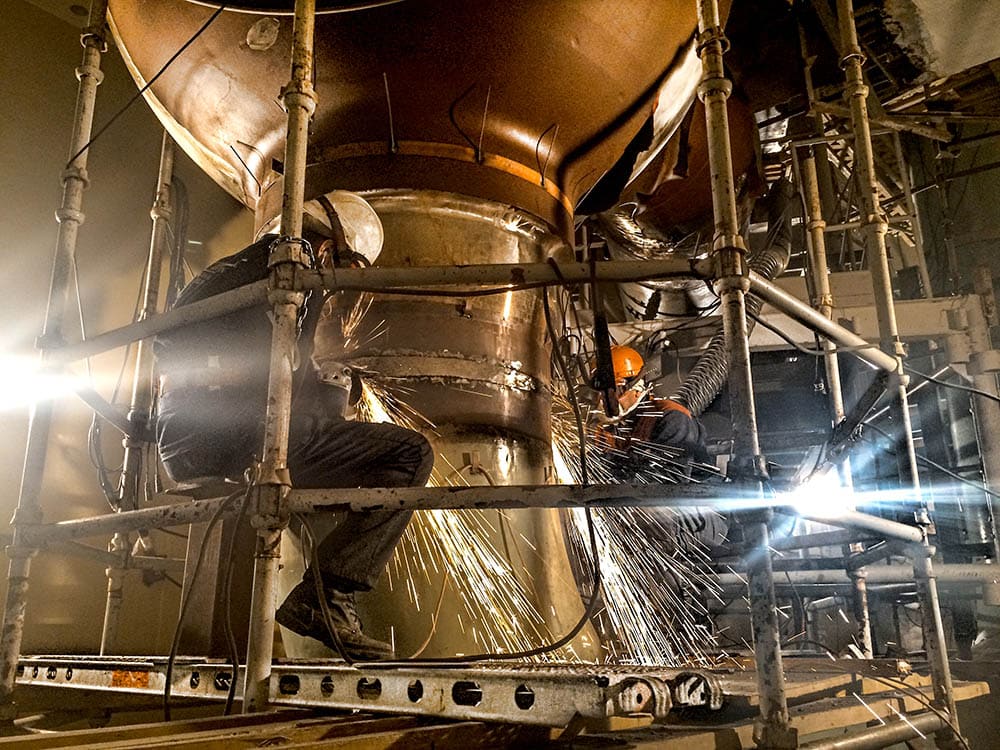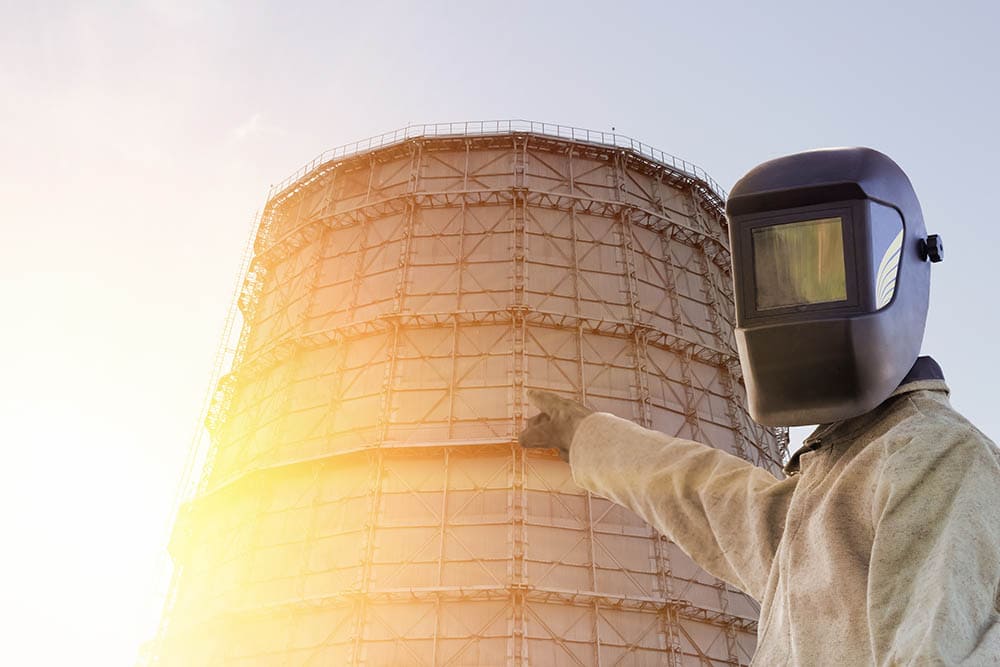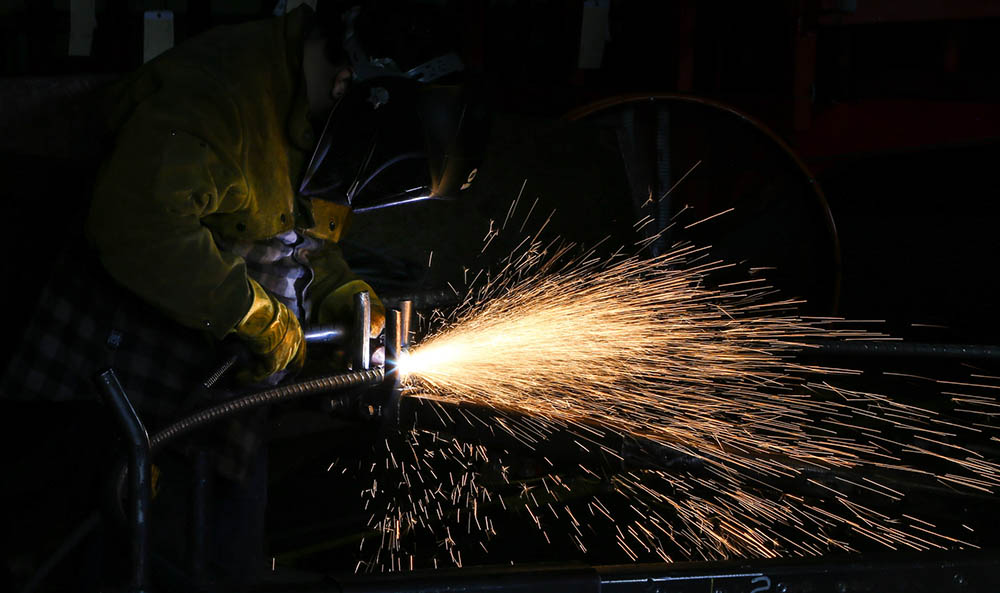What is a Nuclear Welder, And How Do You Become One?
Last Updated on

If you want to enter the lucrative field of nuclear welding, you should know that it involves working with radioisotopes. Most nuclear welders work in laboratories. They fabricate, assemble, and repair materials.
In this article, we will not focus on a nuclear welder’s salary. Instead, we will provide insight into the world of nuclear welding and help you get a job in one of the best and most lucrative industries around.
What is Nuclear Welding?
Nuclear welding is a process by which two metals are joined. The fusing of atoms is what causes this joining. The joining process is called fusion.
Nuclear welding uses electricity, not heat. It takes place at high fusion temperatures (3,000°C).
Most nuclear welding is done in submarines, where welding is needed in cramped spaces. Here, nuclear welders can spend up to 12 hours a day. In submarine construction, a welder must handle heavy, radioactive equipment.
Nuclear welding has limitations, though. Its fusion temperature is high. However, it is not hot enough to join incompatible metals. In addition, you cannot control it. Therefore, nuclear welding is most helpful in joining metals with similar properties.
Who is a Nuclear Welder?
Nuclear welders are employed by nuclear power plants and other electrical providers. They work in the dangerous areas of the nuclear plant. Nuclear welders weld together high voltage equipment and pipe systems.
Nuclear welders also facilitate crucial tasks. They include handling nuclear reactors and other nuclear systems. They must work with radioactive materials and nuclear pressure points. Most nuclear welders work in the nuclear power industry. But their training and education can be valuable to many other companies and industries.

Duties of a Nuclear Welder
Nuclear power plants generate electricity by splitting atoms. The nuclear reaction that produces electricity also releases a lot of heat. Control this heat, or it will burn the reactor. The higher the number of atoms split, the more heat is released, and the higher the risk of a meltdown.
So, nuclear power plants need people who can weld huge machines. These welders must be good at math, physics, chemistry, and mechanics. But their main skill is figuring out how to use complex machines effectively.
Other duties of a nuclear welder include:
- Ensuring all materials, equipment, and products meet safety and quality control guidelines
- Ensuring each activity is successful so that no exposure to radiation takes place
- Welding together all the components of a nuclear power plant, except the fuel
- Use lasers to cut and weld steel that would melt if touched with a regular welding tool
- Perform underwater cutting and welding
- Create high-strength joints in a steel containment vessel using a shielded electrode arc
- Interact with radiation control monitors to ensure the nuclear power plant is in peak performance
- Controls spread of radioactive contamination on breathing air source by using self-safeguard mechanisms
- Repair and replace parts of nuclear reactors
- Perform tests and inspections to ensure safe operation
- Controls in-core shielding gas distribution in pressurized, gas-cooled reactors
- Assemble, operate, and troubleshoot nuclear power plant piping systems
- May be responsible for the servicing, repair, or replacement of damaged systems
- May be required to participate in emergency response efforts

What Skills are Nuclear Welders Required to Have?
Nuclear welding is the joining of materials using high-frequency electromagnetic waves. You use an arc weld torch. You can use this process to join any material. It makes it ideal in the many methods of the nuclear power industry.
Before you are allowed to use this form of welding, there are some essential skills you need to master. They include:
- Ability to follow instructions: In nuclear welding, precise details matter. If a nuclear welder is not accurate, a future nuclear explosion could be their fault.
- Willingness to work hard for long hours: Nuclear welders work for long hours in environments with poor air circulation.
- Desire to Learn –Nuclear welding is a skilled trade, and welders need to learn new procedures.
- A sense of responsibility for safety: A welder is responsible for the safety of other workers in the nuclear power plant. They also make sure the public is safe.
- A basic grasp of math or science: A welder must understand the basic concepts behind nuclear physics, chemistry, and engineering.
- Ability to deal with stress: A welder may have to deal with stress from boredom or frustration. Stress on the job can also lead to stress in family life.
- Order: A nuclear welder must follow procedures. They must follow instructions even when they are not pleasant.
- Ability to work under pressure: A welder must be able to stay calm when something goes wrong. A nuclear welder in a stressful situation must remain calm to avoid aggravating the situation.
How to Become a Nuclear Welder
If you desire to become a nuclear welder, you have made a wise decision. The nuclear welding industry is projected to grow by 20% in the next five years.
Becoming a nuclear welder is a rewarding career that allows you to work with cutting-edge technology. Nuclear power plants need highly skilled welders to create and maintain complex systems. These systems produce large amounts of energy.
Here are several steps to follow to become a nuclear welder.
1. Get a High School Diploma
Your high school diploma is proof that you have completed your formal education. You can get a diploma by graduating from a senior high school.
The next step is to get your GED if you did not finish school. It proves you are on the same level as someone with a diploma. It only takes around six weeks to study for GED and take the test.
2. Study Nuclear Welding an Accredited College
Many accredited colleges are offering nuclear welding programs. They are accredited by the American Welding Society (AWS).

3. Get Your Certifications through the American Welding Society
The AWS is the world’s largest welding society. It offers Associate, Professional, and Certified welding certifications.
- Associate Certification is for people who have no welding experience.
- Professional Certification is for people who have welding experience but want to specialize in one field.
- Certified Welding Certification is for those who have welding experience, a welding degree, and have passed a certification exam.
Each of these certifications requires passing a written exam, a welding skill test, and a background check.
The certification process for welding tests nuclear welders on several skills. Most nuclear welders only need a Level 1 certification. Some welders need a Level 2 certification when working on specific materials.
An AWS Level 1 certification test has four sections:
- Basic welding skills
- Weld testing
- Metal structure
- Metallurgy
A certification from the AWS indicates that you have the necessary qualifications to perform tasks related to nuclear welding.
4. Get your WGA Certification
You will also need a WGA certification to become a certified nuclear welder. The WGA (Worldwide Gas Association) is the governing body in welding. It is dedicated to promoting high welding standards and certification programs.
A WGA certification means that you have been trained and tested on suitable nuclear welding procedures and equipment and that you are qualified to weld.
You’ll earn a WGA certification by passing a 6-hour written test and a 7-hour practical test, plus two years of practical experience as an apprentice.

5. Become an Apprentice
The best way to develop your skills is to work alongside an experienced nuclear welder. It is essential that you be around an expert to teach you the ins and outs of the trade.
Becoming an apprentice is a lot cheaper than going to college. It gives you the chance to learn the trade without all the hassle. Plus, you’ll earn some money while you’re at it.
6. Stand Out by Improving Your Resume and Portfolio
First, you need to be good at what you do. So, the next step is to improve your nuclear welding skills and your projects and make everything you do reflect your capabilities.
Your resume and portfolio are crucial documents when applying for a job. They are the first thing a recruiter or an employer will see.
A resume is a document that describes your skills, education, and experience. On the other hand, a portfolio is a document that displays samples of your work. Employers use your resume and portfolio to evaluate whether you are qualified for a particular job or career.
7. Networking and Filling Out Applications
Applying for a nuclear welder job can be challenging; you must be persistent and proactive. Consider networking as well. Also, contact local nuclear facilities. If your connections are strong enough, consider getting in touch with nuclear facilities in other states.
Final Thoughts
Nuclear welding is one of the fastest-growing careers today. As an aspiring nuclear welder, you might feel in the dark when it comes to understanding what it is like to be in this career field.
Overall, a job as a nuclear welder is a solid choice if you want a high salary and a great life. That said, you must be willing to put in your time and effort to get there. You must have the dedication, ambition, and skills to become a nuclear welder.
Featured Image Credit: Viktor_LA, Shutterstock
